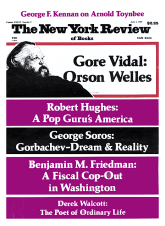In response to:
Moscow: The Struggle for Reform from the March 30, 1989 issue
To the Editors:
Unhappily, an error crept into my article “Moscow: The Struggle for Reform” [NYR, March 30]. Footnote 4 reads: “The draft of the new Principles of Criminal Legislation of the USSR…suggests that some of the laws that had been used against political opponents will be dropped and others drastically revised.” As examples, I mentioned articles 70 and 190-1. The text should have read: “According to several distinguished Soviet legal scholars, including Sofia Kelina and Aleksandr Yakovlev (not to be confused with his Politburo namesake), both among the drafters of the Principles, some of the laws that had been used against political opponents will be dropped…” etc.
Unfortunately, the expectations of Yakovlev et al. have not proved altogether justified. On April 8, the Presidium of the USSR Supreme Soviet nullified Article 70 with a decree which does indeed do away with the formula “anti-Soviet agitation and propaganda,” replacing it with the formula of “calls for the overthrow or change of the Soviet state and social system.” The stipulated penalties are considerably milder than those in the old article, but on the other hand they are to be applied to such arbitrarily defined “crimes” as “obstructing the execution of Soviet laws,” as well as to “public calls for the betrayal of the Motherland”—a provision that was supposed to have been abolished.
Another decree, passed at the same time, replaces Article 190-1, which dealt with the “deliberate dissemination of fabrications discrediting the Soviet political and social system.” Milder than its predecessor, the decree nevertheless prohibits the “defamation” of state organs or “officials appointed, elected, or approved in the office” by the government. All told, both these decrees hardly square with the promise made by Gorbachev in his UN speech last December, in which he promised to do away with all laws proscribing freedom of speech.
Two caveats are in order: First, the decrees have already elicited vigorous protests in the Soviet press and television. Second, while they go into effect immediately, they will become law only after the whole criminal code is discussed and approved by the new Soviet parliament (Supreme Soviet). And with the rising spirit of defiance in the USSR, it is likely that the parliament will strike down their most objectionable features.
There have been a number of significant developments since I wrote my article, some of a disturbing, and some of an encouraging nature. Among the first is yet another decree, published in February, requiring journalists to obtain special passes from the Ministry of Internal Affairs in order to cover rallies, meetings, and scenes of accidents. The decree was denounced by many writers and journalists (e.g., in Sovetskaia kultura, February 25); but it was no doubt welcomed by an apparat fiercely resisting every effort to introduce democratic reforms. Worth mentioning, too, is the statement made a few weeks ago to the US Commission on Security and Cooperation in Europe by Lev Timofeev, editor of the unofficial journal Referendum, that “not a single independent publication has been registered or officially recognized.” The bloody events in Georgia mark yet another blow at perestroika, one that might well have been deliberately provoked (as I was told by a Georgian film director who was there at the time) by Gorbachev’s enemies.
At the other side of the ledger are the increasingly combative tone of the Soviet media and the announced plan of a number of radical public figures (such as the historian Yuri Afanasyev and the economist Gavril Popov), recently elected to the Congress of People’s Deputies, to form a “progressive wing” in the forthcoming parliament—which is to say, something in the nature of a “loyal opposition.” Criticism of Lenin, Marx, and Marxism is growing. In the literary monthly Raduga (No. 2, 1989), for instance, the writer Mikhail Shilov accuses Lenin of having provided “the chief precondition” for Stalin’s tyranny by establishing a one-party system in 1918. In a four-part article in the journal Nauka i zhizn (Nos. 11 and 12, 1988, and Nos. 1 and 2, 1989), the philosopher Aleksandr Tsipko argues that it was the Bolsheviks’ adherence to Marxism—a doctrine “in conflict with life,” wrong in its espousal of the “class approach,” and “unable to foresee the future”—that was directly responsible for Stalin’s “barrack-type socialism,” the collectivization of agriculture and the abolition of any form of a market economy—a policy which leads inevitably to “totalitarianism.” Tsipko’s views were subsequently spread over two pages in the weekly Moscow News (No. 16, April 1989). And on April 22—the 119th anniversary of Lenin’s birth—the theater director Mark Zakharov, appearing on the television program Vzgliad, urged an end to the “religious” cult of Lenin, and the removal of his embalmed body from the mausoleum.
The most dramatic event, however, was the victory won by Gorbachev at the plenum of the Party’s Central Committee on April 25. It had long been an open secret that Gorbachev has been trying to weed out his opponents from this powerful body. The departure of 110 members, among them holdovers from the Stalin and Brezhnev eras (e.g., Andrei Gromyko and Boris Ponomarev) makes it virtually impossible for the few remaining “conservatives” to use the Central Committee as an instrument against the First Secretary, and gives the latter a far freer hand to proceed with his reforms.
Abraham Brumberg
Chevy Chase, Maryland
This Issue
June 1, 1989



